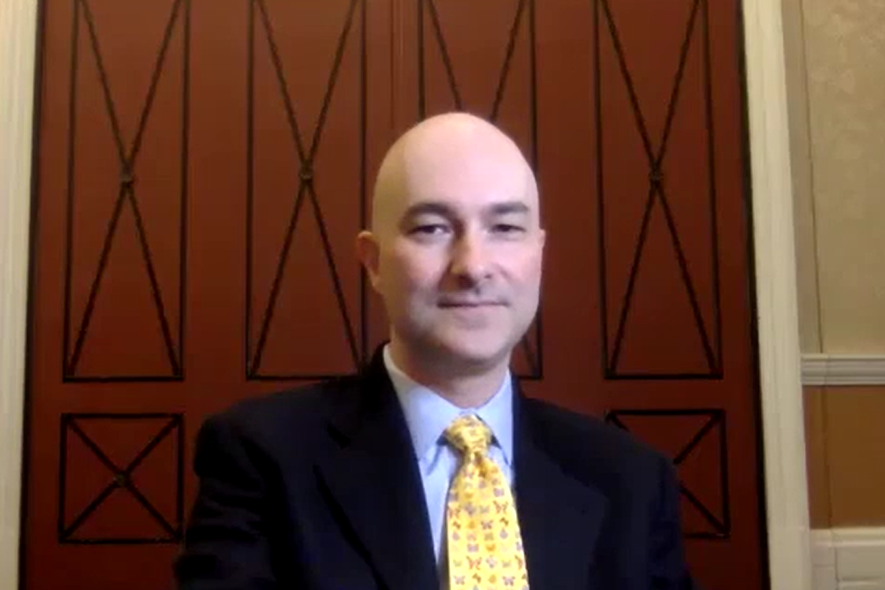Samuel Southgate, MSIV, University of Connecticut School of Medicine
EMRA MSC Editor, 2019-20
This month our PD Q&A series turns to New England. We spoke with Shawn London, MD, program director for UConn's Integrated Residency in Emergency Medicine, about the training opportunities available in Hartford, CT, and what his team looks for in aspiring residents.
What sets your program apart from others?
Three things set UConn apart from other programs:
1. A wellness-focused environment: We believe that your residency is the starting point for what will hopefully be a long and fulfilling career in emergency medicine. In the same way that the clinical experiences you have in residency will define your performance envelope as a physician, we believe that the training environment you experience during residency as part of the UConn family will help form the foundations of resilience that will serve you well throughout your career. You will not come to work happy, healthy and ready to work unless you have protected time to learn, to explore your academic interests as a resident and to attend to your personal/relationship needs. Among other things, wellness at UConn means being excused from your clinical duties for conference regardless of your rotation and the fact that residents are not scheduled 12 hour shifts in any of our ED sites.
2. A rigorous clinical environment with excellent ancillary staff support: Our residency covers four clinical sites with a total footprint of more than 285,000 ED patient visits per year (including a freestanding pediatric trauma/tertiary referral center adjacent to our primary clinical site) but the clinical experience in our residency is punctuated by excellent ancillary services, so “scut work” is kept to a minimum. We have resources such as 24-hour patient transport, ED phlebotomy, pharmacy technicians to help obtain medication histories, “comfort associates” to help assist patients and their families, and 24-hour IV therapy services to ensure that you are focused on physician-level patient care and procedures.
3. A rigorous longitudinal simulation and ultrasound curriculum: These experiences are built in to our weekly didactic sessions and begin at the very start of our six-week orientation block. Our simulation curriculum is run out of our primary clinical site’s 45,000 sq. ft. freestanding simulation center which includes a cadaver lab and procedure arcade. The progressive simulation experience throughout your three years is a perfect complement to our busy clinical sites and prepares you for the challenges of hands-on patient care in a supportive, interactive environment. We believe that our first-rate point-of-care ultrasound curriculum provides an excellent foundation for your skills to grow throughout residency, with regular hands-on sessions during our weekly conferences led by our five ultrasound fellowship-trained faculty members. Our active quality assurance program (including Butterfly iQ devices) ensures that you learn from every scan, whether it is performed in the ED or the ICUs, with most residents logging more than 1,000 scans during their three years with us.
What are the benefits of attending a 3- vs. a 4-year EM residency program?
The most important factor in this perennial debate is identifying a program that meets your needs and feels like a great “fit”. At the same time, we believe that three years in our rigorous program guarantees that you will be an excellent emergency physician who will be prepared for any clinical environment and who has an excellent foundation in academics. In the current job market, many EM graduates who aim for an academic career will pursue fellowship training, regardless of whether they completed a three or a four-year program. In our experience, after three years, we find that most residents are eager to “specialize” and begin the next step of their training in fellowship or to embark on their career as an attending.
What is something students may not know about your program?
There are two things we like to point out:
1. We consider airway management a core skill in emergency medicine. To provide this critical experience, our residents are the primary managers of all airways - medical and traumatic. Our longitudinal simulation curriculum provides an outstanding framework for mastering routine and difficult airway skills starting in orientation and progressing through third year. Residents learn the gamut of techniques from advanced direct and video laryngoscopy to surgical and flexible fiberoptic airway skills.
2. Since our trauma activation criteria at our primary clinical site is based on injuries and not mechanism alone, EM residents primarily evaluate 90 percent of trauma patients presenting to our ED. This provides the best of both worlds: residents have a “real world” EM physician experience of managing trauma without a trauma team in the room, but have Level I trauma center resources available at the EM team’s discretion.
What range of USMLE/COMLEX Step 1 scores do you look for in an applicant for the program?
We recognize the fact that the USMLE/COMLEX tests are not designed to predict success in residency or beyond and manifest all of the shortcomings of standardized testing. We cannot imagine an environment less like the emergency department than sitting in a quiet room for hours on end answering questions on a computer one at a time. Therefore, we utilize a holistic applicant evaluation approach and consider all applicants who have a passing score on Step I of the USMLE/COMLEX.
What kinds of opportunities for research exist? Do you look for residency candidates with research experience?
While we welcome applicants with research experience, we realize that it can be challenging to get involved in a research project in medical school. Therefore we do not exclude applicants who do not have this on their CV. We have excellent research support including dedicated biostatistics support for residents and an active research program involving simulation, ultrasound, education, and quality improvement. We require research as part of the residency scholarly activity and are able to support our residents to travel in order to present their project. Since all residents are guaranteed travel to one conference, this represents an opportunity for additional travel.
Do you have opportunities to explore global health at your institution?
We encourage residents to use as much of their elective time as they would like to explore international opportunities with a strong demonstrated educational value. Our residents travel extensively, with recent international destinations including the Dominican Republic, Haiti, Indonesia, Bhutan, and Uganda. They are encouraged to take residency Butterfly iQ point-of-care ultrasound devices with them and they can even receive quality assurance feedback from across the globe. In addition, we have an international emergency medicine track (in partnership with our International Disaster Medicine Fellowship) beginning first year, which integrates planning for international travel and the residency scholarly project into one longitudinal experience.
What are some qualities that your program looks for in applicants? Can you describe any attributes and qualities that make applicants stand out?
We value residents who are active learners, since our program has an extensive integrated simulation curriculum, has an active peer-teaching group, and extensive electronic independent learning resources. In addition, applicants must understand the value of teamwork and help us build on and maintain the collegial atmosphere of our program. Applicants with prior leadership experience as well as “non-traditional” students with prior careers are also looked upon favorably in our program.
Check out an earlier Program Director Hangout with Shawn London, MD
TOPIC: "Program Director Interview: University Of Connecticut”
Northeast Region: Farmington, CT
Shawn R London, MD, FACEP
Residency Program Director
Assistant Professor




